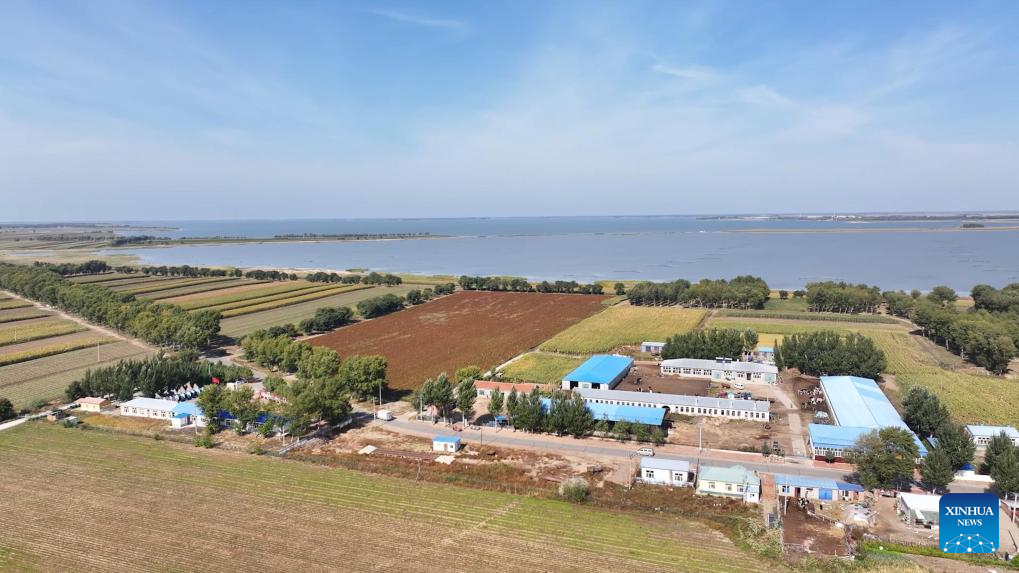Across China: Urbanites embrace the charm of rural China
Source: Xinhua
Editor: huaxia
2025-06-26 11:09:30

This undated photo shows a view of Nangang Village, Mongolian Autonomous County of Dorbod in Daqing City, northeast China's Heilongjiang Province.(Xinhua)
HARBIN, June 26 (Xinhua) -- In the picturesque countryside of northeast China, rural tourism is breathing new life into villages that were once overlooked and forgotten.
The Phoenix Bay Scenic Area in Nangang Village, Daqing City, Heilongjiang Province, is drawing an increasing number of visitors with its lakeside charm, mild climate and unique Mongolian culture, offering a genuine glimpse of idyllic rural life.
The village's transformation began in 2017, when a team from the provincial department of culture and tourism arrived to kickstart the revival.
Recognizing Nangang's vast potential for rural tourism thanks to its rich ecological assets, the team mapped out plans to transform farmland into scenic landscapes, village homes into lodgings, and local produce into distinctive souvenirs, gradually shaping the scenic area.
After seven years of efforts, the scenic area's annual visitor numbers have soared to 100,000, bringing in tourism revenue of over 20 million yuan (about 2.8 million U.S. dollars).
Li Xiumei, who became Nangang's first secretary in 2023, set out to spearhead innovative rural tourism development, transforming the scenic area into a year-round leisure destination.
"Traditional offerings like agritainment resorts no longer satisfy modern expectations," Li said. "Visitors are now drawn to high-quality accommodations, authentic cultural experiences, and a wider variety of attractions."
The scenic area now thrives all year round. In summer, it serves as a premier getaway where visitors cool off in clear lakes and enjoy exhilarating lake plane rides with breathtaking aerial views. In winter, it turns into a snowy playground, offering traditional ice fishing experiences.
"This summer, we've introduced horseback riding, all-terrain vehicle (ATV) rides, and photo tours. Visitors can also stay in cozy log cabins or tents, making their experience even more memorable," Li said.
In recent years, China's rural tourism has evolved from simple sightseeing to offering a variety of immersive experiences. Activities like hiking, fruit picking and engaging with folk culture are increasingly popular.
According to the "No. 1 central document" for 2025, unveiled in late February, the country will advance the deep integration of rural culture and tourism and initiate pilot projects to empower rural revitalization through cultural industries.
Rendong Village, in the city of Hailun, Heilongjiang Province, has pioneered personalized tourism by allowing visitors to adopt fruit trees and take part in the harvest. This year, 350 premium cherry trees have been planted for eco-friendly cultivation and off-season sales, supported by the innovative tree adoption program.
"Residents who adopt the trees are guaranteed a minimum yield of 1 kilogram," said Qu Weijun, Party secretary of the village. "Adopters can also have barbecues or pick wild vegetables in the orchard for free."
The village also provides customized vegetable plots for urban residents pursuing a healthy lifestyle. Participants in the initiative can choose to cultivate their plots themselves or leave the farming to local staff.
"Watching her first cucumber bloom, my daughter danced with excitement," said a woman surnamed Chen, who joined the farming initiative. "The countryside reveals nature's healing power and teaches children valuable, hands-on lessons."
Data from the Ministry of Culture and Tourism shows that China's rural tourism recorded 707 million visits in the first quarter of this year, up 8.9 percent year on year, generating a revenue of 412 billion yuan, reflecting growing urban appetite for pastoral lifestyles.
"We're selling lifestyles, not just landscapes. Our villages retain nostalgic charm where mountains meet waters," Qu said. ■



